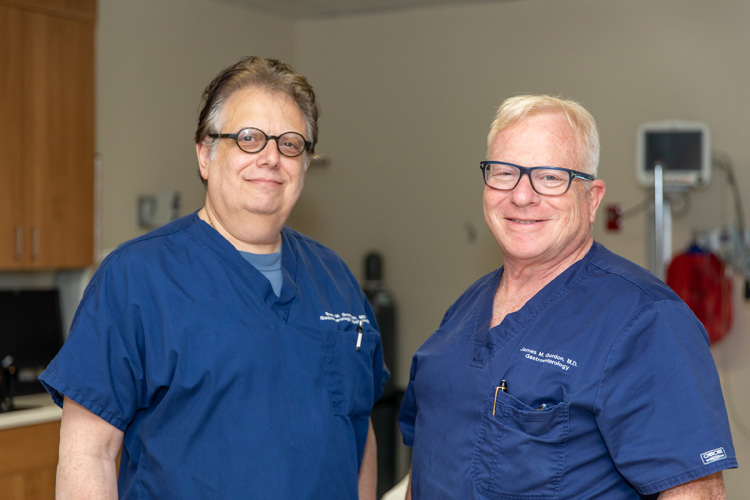
Gastroenterologists Dr. James Gordon and Dr. Bruce Grossman at Cleveland Clinic Indian River Hospital’s Scully Endoscopy Center have developed some witty repartee that belies the seriousness and persistent unpopularity of many procedures they have to perform in order to keep their patients healthy.
That’s not surprising. When dealing with issues like constipation, irritable bowel syndrome, hemorrhoids, anal fissures, perianal infections, diarrhea, fecal incontinence and colorectal cancer on a daily basis, a sense of humor is important.
If you add a heathy dose of patient empathy to that light-hearted banter, you’ve got a pretty good profile of both Grossman and Gordon.
That’s especially important when the conversation turns to colorectal cancer.
According to the Colorectal Cancer Alliance, “colorectal cancer is the third most common cancer in the U.S. and the second leading cause of cancer death. It affects men and women of all racial and ethnic groups and is most often found in people 50 years or older. This disease takes the lives of more than 50,000 people every year.”
Equally important is the fact that in its earliest, most treatable stages, there are often no obvious symptoms tied to this disease.
The best way to detect colorectal cancer is with a colonoscopy, which the National Institute of Diabetes and Digestive and Kidney Diseases describes as “a procedure in which a doctor uses a colonoscope, a flexible fiber-optic tube with a tiny video camera at the tip to look inside the rectum and colon. Colonoscopies can show irritated and swollen tissue, ulcers, polyps” and telltale signs of cancer.
Johns Hopkins offers a somewhat more graphic description.
Says the Baltimore medical center: “During the colonoscopy, your doctor will insert an intravenous line to administer fluids and sedatives; perform a digital rectal exam by placing a gloved, lubricated finger inside your rectum; place the colonoscope into the rectum, advancing it up the colon, while a video camera inside the colonoscope transmits images of your colon to a nearby monitor. He or she may then inflate the colon with air to improve visibility; biopsy or remove polyps to send to a laboratory for analysis and treat any bleeding inside the colon.”
And prior to the actual procedure, patients are required to fast for a period of time and take large doses of laxative to clear out the colon so the doctor can better see its condition.
So, talking patients into having a colonoscopy can be a challenge – even though the procedure could save those patients’ lives.
It probably doesn’t help in getting patients through the door that the “Cologuard” tests advertised on TV forego the fasting, probing and inflating, but Grossman and Gordon say those tests are not for everyone.
Gordon says “Cologuard is a good test, but you need to be the right person. You need to be of average risk – someone between the ages of 50 and 75 with no prior history of colon polyps and no family history of colon cancer – but for people who have a history of colon polyps, it is not a good test for them.”
Meanwhile, Grossman points out that the mechanics of the Cologuard test lead to many false-positive results.
“People have to realize that the Cologuard is a combination of two tests. It’s not just the DNA for colon cancer. It also has the old stool-for-occult-blood test in it as well so when we get back a positive, we don’t really know which part of that test is positive. So, people get scared right away. They think they have colon cancer,” Grossman continues, but he quickly points out that’s frequently not the case.
The colonoscopy is a far more definitive test, but with many patients it’s less popular than going to the dentist for a root canal.
One thing both Gordon and Grossman have decided to do to encourage people who should have a colonoscopy to actually get one is to make it easier for them to get an appointment.
That;s why the Scully Endoscopy Center just launched its “Open Access” program.
Gordon explains, “Primary care physicians can directly refer their patients to us. We have a nurse screen them and then we can schedule them within one week.”
If you want to get on Grossman or Gordon’s good side before they start inserting, ask them about the “Center of Excellence” designation that was just awarded to the Scully Endoscopy Center. Or maybe the recognition from both the American Society for Gastrointestinal Endoscopy and the American College of Gastroenterology for its adenoma (pre-cancerous polyps) detection rate, which Gordon says is “the best marker of quality out there.”
With seven gastroenterologists on staff and three specifically designated endoscopy rooms running full time – and the new “Open Access” program now in place – the Scully Endoscopy Center at Cleveland Clinic Indian River Hospital is doing its best to make it easier for people in the Vero to fight back against colon cancer.
Both Dr. Bruce Grossman and Dr. James Gordon have offices at 3450 11th Court in Vero Beach. The phone number is 772-299-3511.



